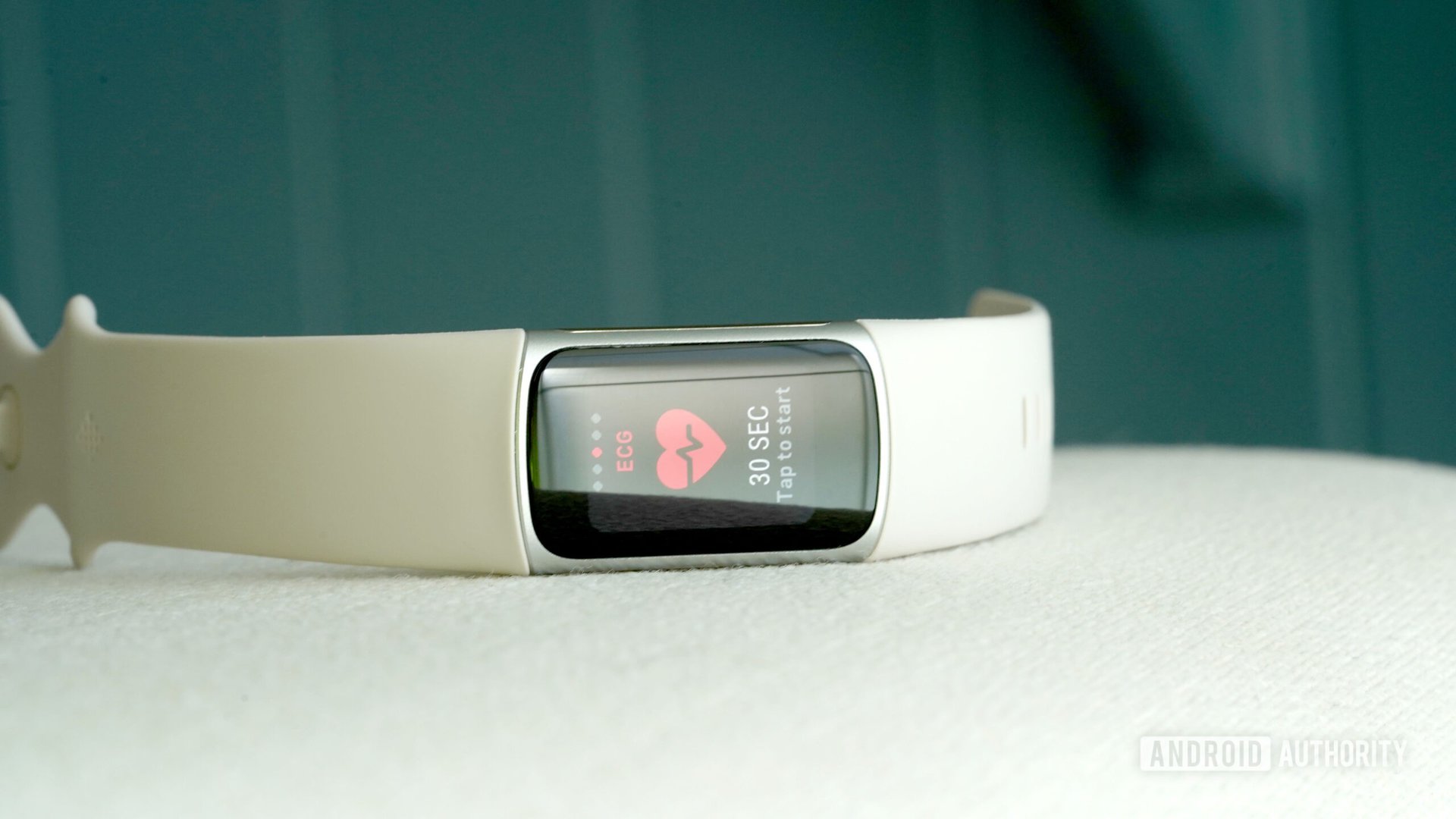Finding the best fitness tracker starts with four basic questions:
- Do you prefer a band or watch-style fitness tracker?
- What activities do you plan to track?
- Do you care about the brand or the platform?
- Are there any special features you need, like SpO2 tracking, built-in GPS, or an ECG?
Once you know what matters the most to you, it’s much easier to pick the right fit. From bands to smartwatches, our team puts every wearable device we review through rigorous testing to ensure only the best options make it on our lists. We dive into everything from activity tracking to sleep tracking to daily use, particularly focusing on user experience, accuracy, and value. Keep reading to see our picks for the best fitness trackers you can buy in 2024.
The best fitness trackers worth considering
To be clear, it’s hard for just one device to fit all user types. Some shoppers might need more app support, while others need a few more bells and whistles. There are plenty of great fitness trackers and watches worth checking out. The list below represents our top picks. With the exception of the Apple Watch, all of the included options work with both iPhones and Android phones.
Band-style fitness trackers:
- Fitbit Charge 6: The Fitbit Charge 6 builds on its predecessor with added Google app integration and upgraded heart rate monitoring.
- Xiaomi Mi Band 8: For shoppers on a budget, the Mi Band 8 is the best cheap fitness tracker you can buy, thanks to its low price point and solid fitness tracking.
- HUAWEI Band 7: The best Xiaomi Mi Band 8 alternative, the HUAWEI Band 7 offers a roomy form factor and all-day SpO2 monitoring, plus useful smart features. Though HUAWEI launched a Band 8, it’s not readily available everywhere.
Watch-style fitness trackers:
- Apple Watch Series 9: For iPhone users, the Apple Watch Series 9 is the best fitness-tracking smartwatch. It’s arguably the best smartwatch you can buy and has great workout capabilities.
- Garmin Venu 3: The Venu 3 is highly accurate, with many sport modes and useful extras like voice calling and nap detection. It’s one of the best fitness trackers available from Garmin.
- Garmin Forerunner 265: One of the first Forerunner devices to feature an OLED display, this smartwatch is a much-anticipated update to the series and a great pick for runners.
- Garmin vivomove Sport: Looking for a fitness tracker that doesn’t stand out? This sneaky hybrid watch could be the perfect fitness tracker for you.
Ring-style fitness tracker
- Oura Ring 3: Currently the leader in a growing market of smart rings, the Oura Ring 3 offers broad activity tracking for users interested in a holistic view of their physical fitness.
Fitbit Charge 6 is the best fitness tracker from Fitbit

Fitbit Charge 6
Useful physical button • Updated heart rate sensor • All sport modes now on device
The Fitbit Charge 6 is the company’s 2023 top-of-the-line fitness tracker
When it comes to fitness trackers, the Fitbit Charge 6 is now the best product in the company’s portfolio. To get anything better, you’d need to jump up to the Sense 2, which is more like a smartwatch. The Charge 6 has a full-color display, 40 exercise modes, and the most advanced heart-rate tracker Fitbit offers.
The latest addition to Fitbit’s stable, the Charge 6, introduces key upgrades to a fan-favorite line. Reliable health sensors and staple Fitbit tools make the device a great choice for most shoppers. The band-style tracker is lightweight and comfortable and boasts a colorful AMOLED display for reading stats. The new model even reintroduces a physical button to smooth and streamline device interaction.
Internally, the Charge 6 provides all the basics, including step and activity tracking, sleep tracking, ECG support, skin temperature tracking, SpO2 monitoring, and the option to take EDA scans. It also supports Fitbit’s Daily Readiness and Stress Management scores with a Fitbit Premium account. Plus, the tracker boasts improved heart rate tracking for more accurate stats than ever, thanks to improved machine learning algorithms. We were generally very impressed with the sensor’s performance during our review period.
Meanwhile, in light of recent changes to the Fitbit stable, the Charge 6 is also a better value than the company’s branded smartwatches. It doesn’t pack all the same smart features but offers useful integration with Google Wallet, Google Maps, and YouTube Music. All of these tools make the tracker a more useful workout companion. Unfortunately, it suffers from some major drawbacks regarding GPS performance. This makes the Charge 6 hard to recommend for long-distance training, but it’s a great pick for basic activity tracking. It also works seamlessly with both Android phones and iPhones, making it approachable for even more shoppers.
What makes it stand out
- Google’s influence adds smartwatch-like smarts: Useful integration with Google Wallet, YouTube Music, and Google Maps elevate the tracker into near smartwatch territory for a powerful all-day device.
- Key design and UI upgrades: The latest model’s physical button makes for easier user interaction. At the same time, the availability of all sport modes right on the device makes tracking even more convenient.
- Upgraded heart rate monitoring: Thanks to improved algorithms, heart rate tracking on the Charge 6 is more accurate than ever.
Xiaomi Mi Band 8 is the best cheap fitness tracker
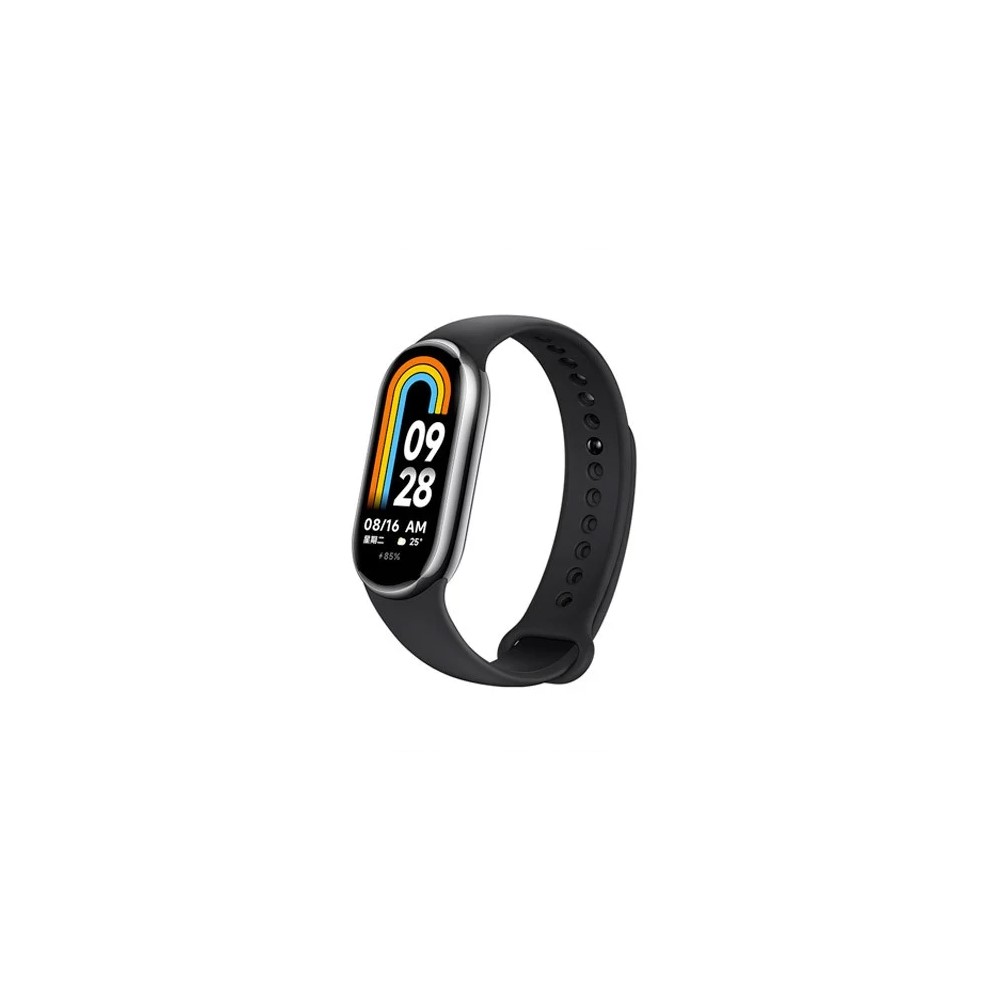
Xiaomi Mi Band 8
Accurate health and fitness tracking • Affordable price point • Unique form factor
Once again, Xiaomi delivers a well-rounded fitness tracker at an approachable price.
The Xiaomi Mi Band 8 features an all-new strap design and the same vibrant touchscreen display found on the previous generation. On the wrist, as a necklace, or even attached to a running shoe, the device tracks key fitness stats and offers useful health monitoring tools to users eager to keep an eye on their wellness. It’s a powerful, entry-level tracker at a great price.
For anyone on a budget, Xiaomi’s Mi Bands come highly recommended. We even awarded the last generation with an Editor’s Choice. We’ve yet to review the Xiaomi Mi Band 8, but we’re confident the tracker offers the same reliable experience we’ve found in the past, with a few new perks. For starters, the Mi Band 8 introduces a slightly more elevated look and is designed to be wearable as a necklace or attached to a gym shoe. That means more versatility in how you track your stats throughout the day.
A very solid entry-level device, the Xiaomi Mi Band 8 tracks steps, distance, and calories to VO2 max, blood oxygen saturation, heart rate, sleep, and stress. In addition to these basics, the band also offers tracking for more than 150 unique activities. It even features an upgraded accelerometer, so users can workout alongside movement-based fitness courses in the Mi Fitness app. Unfortunately, the band does not feature built-in GPS, but it does offer connected GPS if you’re willing to pocket your phone for runs and rides.
The band also boasts a battery life of 16 days with regular use or six days with the always-on display enabled. The band’s colorful 1.62-inch AMOLED display may look a lot like that of the Mi Band 7, but the latest model now has a 60Hz refresh rate and brightness of up to 600 nits. Coupled with the device’s quick-release strap, the effect is a more attractive and user-friendly device.
What makes it stand out
- That price tag: The Mi Band 8 is a good fitness tracker at a great price. It’s at least $30-$40 cheaper than most trackers while offering many of the same features.
- Versatility in how you wear it: The device takes tracking beyond the wrist with the added ability to wear the tracker pill around your neck or attached to a gym shoe.
- Tons of features: Generally, “entry-level” fitness trackers lack a lot of advanced sensors like SpO2 and heart rate monitoring. On the Mi Band 8, you’ll find most sensors other major fitness trackers offer, including connected GPS.
HUAWEI Band 7 gives Xiaomi a run for its money
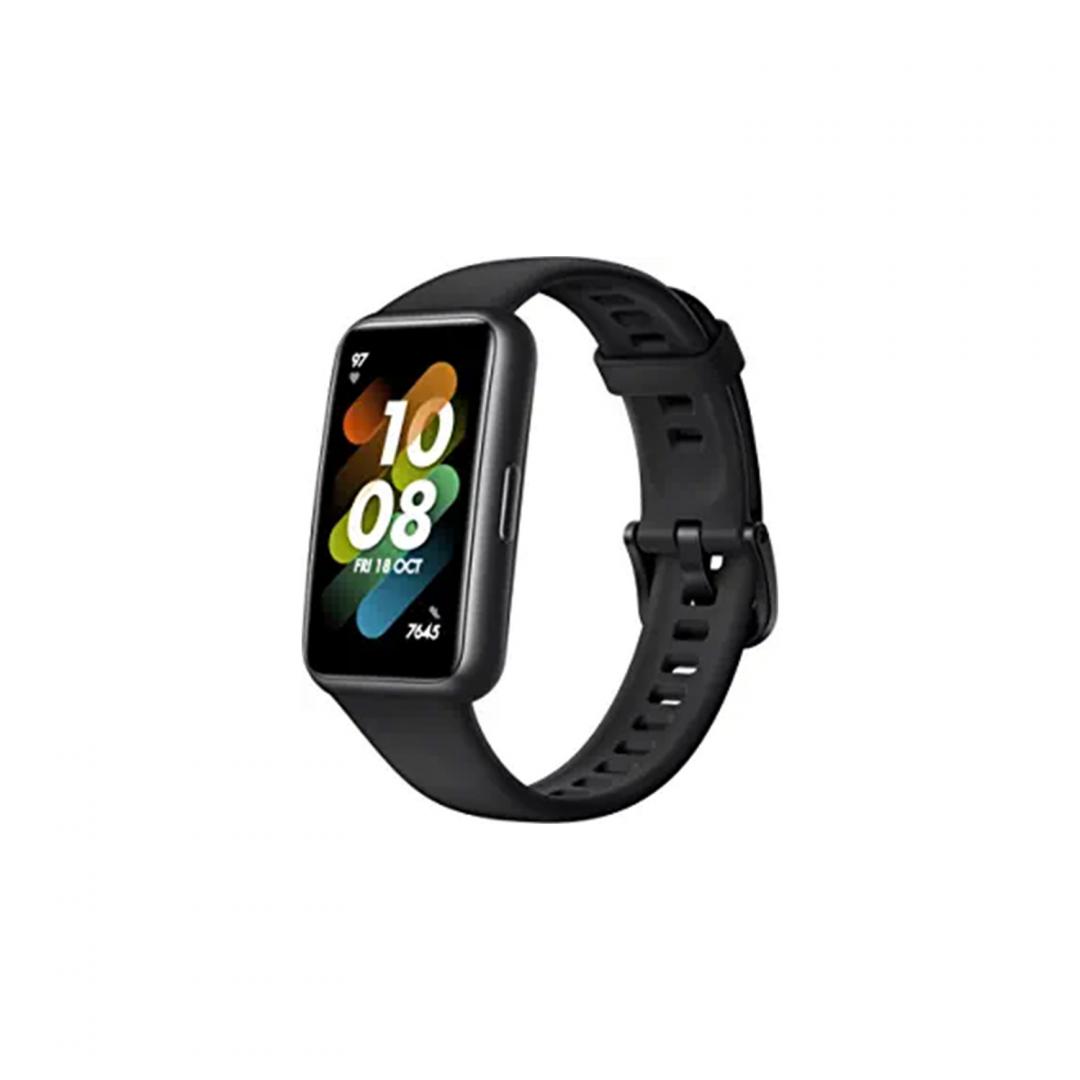
Huawei Band 7
Affordable price point • AMOLED display • Solid tracking suite
An attractive tracker at an incredibly low price
The Huawei Band 7 offers the full gamut of basic fitness tracking plus blood oxygen readings, heart rate tracking, and sleep monitoring. It’s a thin, light fitness tracker with an impressive display for such a low cost.
HUAWEI surprised us with the HUAWEI Band 6, and the 7 builds on its predecessor’s success. Blurring the line between tracker and smartwatch, it sports a large 1.47-inch AMOLED display with ultra-narrow bezels. The Band also offers improved phone integration, including the ability to answer phone calls on the wrist, music, remote camera control, and message quick reply. The device even features support for NFC payments.
In many other ways, the HUAWEI Band 7 is very similar to the Mi Band 7 — and that’s a compliment. Users will find all-day SpO2 monitoring, sleep tracking, 96 workout modes, menstrual tracking, and more. Though we haven’t yet tested the device in-house, we were quite impressed with the accuracy of the Band 6 and the Band 7 is said to improve the user experience even further.
We tested the sleep tracking function on the HUAWEI Band 6 against various devices, including the Fitbit Sense and Garmin Forerunner 245 Music. The results were spot on. In other words, if sleep tracking is important to you, it’s important to note that we found the previous generation HUAWEI Band to be more accurate than the Mi Band 7.
Above all, HUAWEI’s Band 7 is affordable. The device is available to US shoppers for less than $70 from third-party retailers, including Amazon. You can grab the budget device in four colors: black, green, pink, and red. It is water resistant up to 50 meters and boasts up to two weeks of battery life between charges.
What makes it stand out
- Beautiful full-color display: HUAWEI added a vibrant and large display to its tracker line well before Fitbit followed suit. The display here looks great and is shockingly good for a watch at this price.
- Accurate sleep tracking: If you’re interested in sleep tracking, you’ll be happy to know that HUAWEI has a solid reputation for accuracy in overnight data.
- Tons of workout modes: This tracker has over 96 workout modes. This is a lot for even more expensive trackers, making the device one of the best fitness trackers for anyone on a budget.
Apple Watch Series 9 is the best tracker for iPhone users

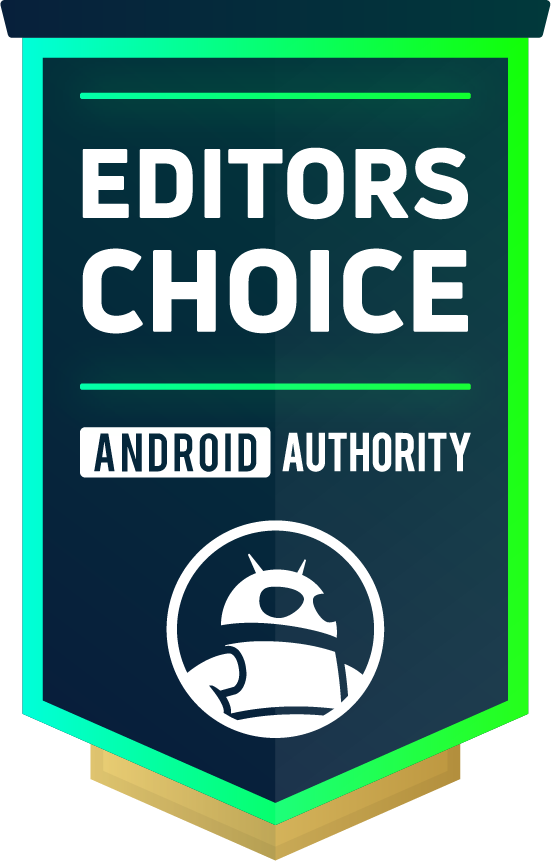
Apple Watch Series 9
Powerful processor • Upgraded display with 2000 nit brightness • Gesture controls and Siri features
Apple’s most convenient smartwatch
The new S9 chip makes the Apple Watch Series 9 the most capable, and battery friendly Apple watch to date. Enjoy improved security, improved functionality in low-connectivity situations, and improved health tracking. Introducing new Double-Tap gesture.
Apple Watches aren’t for Android users, but we highly recommend the Apple Watch Series 9 for iPhone users. In fact, it’s the best wearable you can buy if you own an iPhone. As always, the company introduced iterative upgrades in the latest model, yet we were more than satisfied with its performance during our review period. The device tracks all the basics, including steps, calories, distance, floors climbed, resting and active heart rate, sleep, VO2 max, blood oxygen saturation, temperature, and more. With advanced sensors, it does so accurately. Likewise, GPS tracking with the Series 9 was virtually flawless during our outdoor workouts.
Meanwhile, watchOS 10 brought several improvements to Apple’s wellness tools, including mental health features, workout tracking for cyclists, and changes to medication management. The update also introduced a redesigned interface, including glanceable widgets for easier consumption of stats and data. Additionally, Siri can now process queries on the device, including questions about personal health stats. Users can even interact with the Apple Watch Series 9 more efficiently than ever with Double Tap, a one-handed gesture control that completes simple actions with the tap of two fingers.
From apps to notifications, integration with the iPhone is seamless, and users will find every smart feature needed, from on-wrist phone calls to offline music playback. Unfortunately, battery life remains a hindrance even in the latest generation. The Series 9 will last just over its 18-hour claim, though Low Power Mode helps users eke out additional use between charges.
If you want a smartwatch with accurate tracking and tons of third-party app support, the Apple Watch Series 9 is a no-brainer. For a budget-friendly option, the Apple Watch SE 2 ($269.99 at Amazon) drops a few sensors, but it is still a great fitness tracker. On the other end of the spectrum, the Apple Watch Ultra 2 ($759.99 at eBay) offers a similar experience on a much more durable device.
What makes it stand out
- King of the apps: You can’t do better if you want third-party support. Apple has worked hard to bring in tons of partners. In addition to the 40-plus apps built in, the App Store is loaded with additional tools for athletes.
- ECG support works perfectly: Apple is one of few brands with an FDA-approved ECG monitor. If this is an important health metric to you, you’ll want the Apple Watch.
- Gorgeous and durable design: The Apple Watch design is iconic. It looks great and turns heads. If you care about something that is not only beautiful but highly durable, look no further.
The Garmin Venu 3 is a great workout watch for every niche
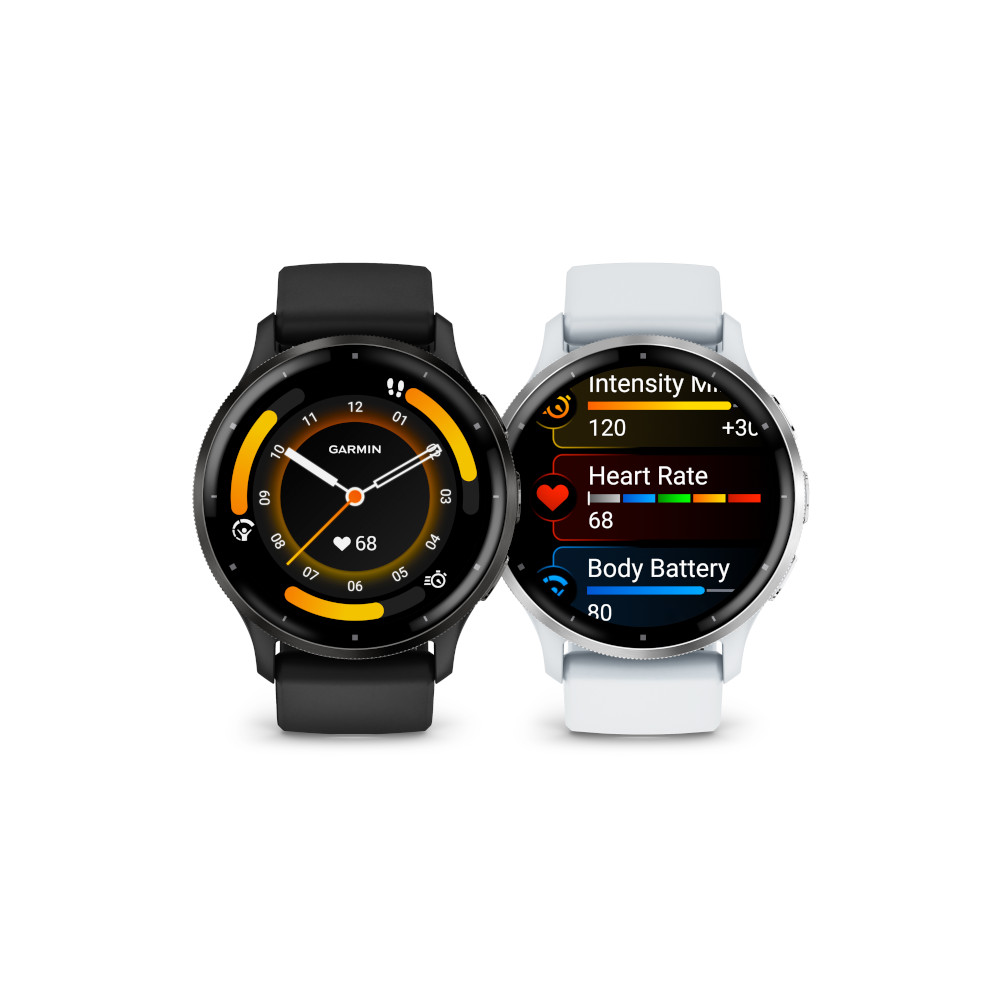

Garmin Venu 3
Highly accurate GPS and heart rate sensors • Automatic nap detection and sleep coaching • Up to 14-day battery life
Accuracy and smarts.
The Garmin Venu 3 and Venu 3S focus on providing personalized data about your health and wellness with some of Garmin’s most advanced body tracking features. The Body Battery function informs you of your activity levels, and new sleep tracking includes nap detection.
The Garmin Venu 3 might be Garmin’s premium smartwatch, but it’s also one of the best fitness trackers. In addition to tracking tons of sport modes and advanced workout metrics, the watch also offers Garmin’s Health Snapshot feature, which takes a two-minute recording of your health stats, including heart rate, heart rate variability, blood oxygen levels, respiration rate, and stress. The Venu 3 also offers the same FDA-approved ECG app found on its predecessor for recording on-demand readings and monitoring signs of AFib.
Meanwhile, the rest of the core health fitness features are as accurate as you’d expect from one of Garmin’s best watches. The Venu 3 features multi-band GNSS and the company’s latest Gen 5 Elevate optical heart rate sensor. It also boasts Garmin’s top training tools, including Body Battery, Recovery Time, Workout Benefit, Perceived Exertion, Garmin Coach, and more. On the sleep tracking front, the device is packed with data points to help users build better bedtime habits. It’s also the first Garmin device to provide automatic nap detection. We loved the accuracy we found in this arena and how Garmin integrates these stats into broader insights.
Overall, the Garmin Venu 3 is one of the best fitness trackers and a great pick from a trusted brand. It’s pricey but also brings key smartwatch features to the table, such as mobile payments, voice calling, and voice assistant support. The device is also available in two case sizes so users can find the perfect fit for their wrists. It won’t offer the same level of integration as an Apple Watch, but it’s still a great pick for borh iOS and Android phone users.
What makes it stand out
- The ability to make calls. While a growing number of smartwatches have call and messaging functionality, it’s still not all that commonplace.
- Assistant support isn’t limited to one platform. Most trackers and watches have built-in assistants, but the Garmin Venu 3 uses the phone in your pocket. This means you can choose between Bixby, Assistant, Siri, and others.
- Industry-leading fitness tracking features. Garmin is one of the leaders in fitness features and as a result, there are tons of activity modes. There’s support for a wide range of sports, including golf, swimming, strength training, and much more.
Garmin Forerunner 265 is one of the best fitness trackers for hardcore runners
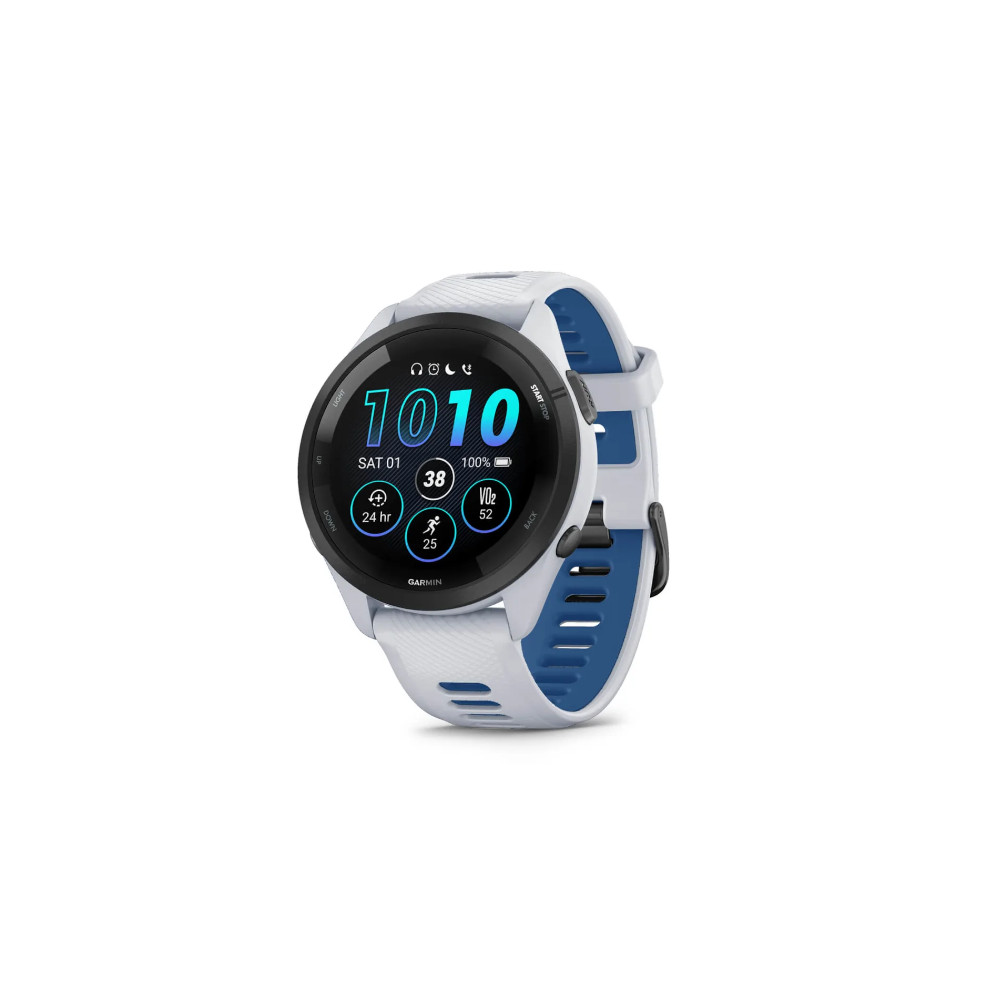

Garmin Forerunner 265
AMOLED display • Music storage • GPS • Health and fitness tracking
Night runs just got a whole lot brighter
Stepping up from its predecessor, the Garmin Forerunner 265 offers the same great features, with improvements to make it a reliable, lightweight running watch with an AMOLED display.
The Garmin Forerunner 265 is easily one of the most impressive running watches we’ve ever used and a welcome upgrade to its already powerful predecessor. The most apparent upgrade on this model is its OLED touchscreen display. It’s bright, responsive, and paired with a colorful UI refresh.
We also applaud Garmin’s decision to offer the watch in two sizes, a 265 and 265S, with the same retail price. Both sizes also feature music storage as standard rather than as an upcharge. The 265S features a 1.3-inch display with 416 x 416 resolution. The 265S has a 1.1-inch display with 360 x 360 resolution. During our review of the smaller model, we hit around four days of usage with the always-on display enabled. In smartwatch mode, the device can last about two weeks.
The Forerunner 255 added NFC support, Morning Report, and an upgraded heart rate sensor to the mid-range lineup. These features return in the Forerunner 265 series, and the sensor accuracy is fantastic. We clocked highly reliable stats throughout our review period, including heart rate data, sleep tracking, and, of course, GPS tracking. The newest model also adds Training Readiness, a popular Garmin metric for dedicated athletes, which is a great tool to see at this price point.
The price of the Forerunner 265 did jump considerably compared to its predecessor, inching the device out of “affordable” territory. However, $449 is reasonable considering the features you’ll find on board. If budget isn’t a consideration, we were also impressed by the Garmin Forerunner 965.
What makes it stand out
- Options for different wrist sizes: The Forerunner 265 is available in a 46mm model and a 42mm 265S model, so everyone can get the perfect fit. Both are the same price and offer music storage.
- Training Readiness is a useful addition: For dedicated athletes prepping for the next big race, Training Readiness is a coveted tool from the Garmin ecosystem.
- The gold standard in heart rate monitoring: Let’s be honest; most trackers struggle for truly accurate heart tracking. The Elevate sensor in the 265 is one of the few monitors that can yield nearly as accurate results as you’d get from a chest strap.
Garmin vivomove Sport is the perfect hybrid for the incognito fitness buff
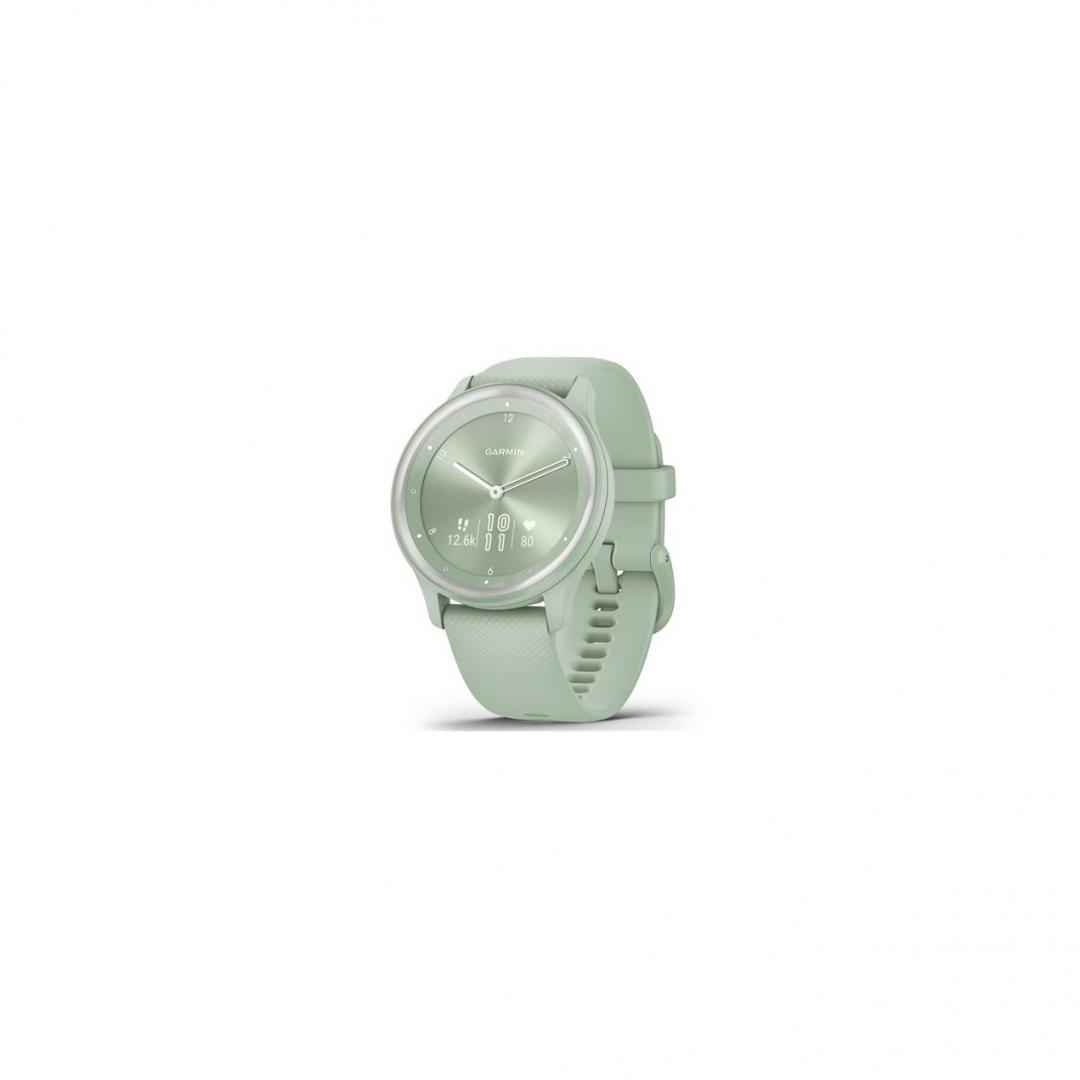

Garmin Vivomove Sport
Sleek design • Hidden screen with analog flavor • Multi-day battery life
This Garmin hybrid watch effortlessly balances style with surprisingly good value
This is the smartwatch you get for traditional analog watch lovers. Despite its minimalist looks, it provides plenty of value. It packs Garmin’s well-known health and fitness features, including Body Battery. But this isn’t why you buy the Vivomove Sport. Its attractive, customizable design is its biggest attraction.
Like everything from Garmin, the vivomove Sport offers the full gamut of fitness tracking. Where it stands out is how it houses them. During our Garmin vivomove Sport review, we fell in love with the device’s form factor, particularly its spy-tech “hidden” display. With real ticking hands, this hybrid watch feels like a classic analog accessory. The aesthetic is completely appropriate for a fancy meal or a night out. Meanwhile, it hides an accurate fitness tracker with some of Garmin’s top tools just a double-tap away.
Navigating the tiny display on the vivomove Sport takes a little getting used to, but we got the hang of it after just a few hours of digging in. The device records all the basics you’d expect from a tracker, plus sleep data, 24/7 heart rate, and stress data. It also offers Garmin’s Body Battery and all-day stress monitoring. Unfortunately, you won’t find a sleep score or built-in GPS here, though you get a connected GPS. We were also excited to see a heart rate monitor in a hybrid, though it’s not nearly as accurate as you’d find on a more traditional fitness tracker.
The Garmin vivomove Sport is the perfect choice if you’re looking for a stylish tracker that blends in wherever you take it. Metallic accents elevate the device, while comfortable silicone bands make it durable for a sweaty workout. Our tests showed around five days of battery life for the hybrid features. After that, the watch would go into an analog-only mode. This mode lets us use the device as a standard watch for about one more day.
What makes it stand out
- A stylish workout companion: The vivomove Sport is a very good-looking device. It offers users a classic look that moves seamlessly between the office and the gym.
- We can’t say enough about the display: The device isn’t just good-looking, it’s clever. This type of “hidden” display isn’t new to Garmin, but it has never been done better than on this device.
- Garmin’s reputation proceeds it: Even though this isn’t a dedicated fitness tracker, it is (as the name implies) a capable sports companion. Garmin is known for accurate fitness tracking, and the company’s Body Battery feature makes this an attractive pick.
The Oura Ring 3 is the best ring-style tracker for monitoring your activity
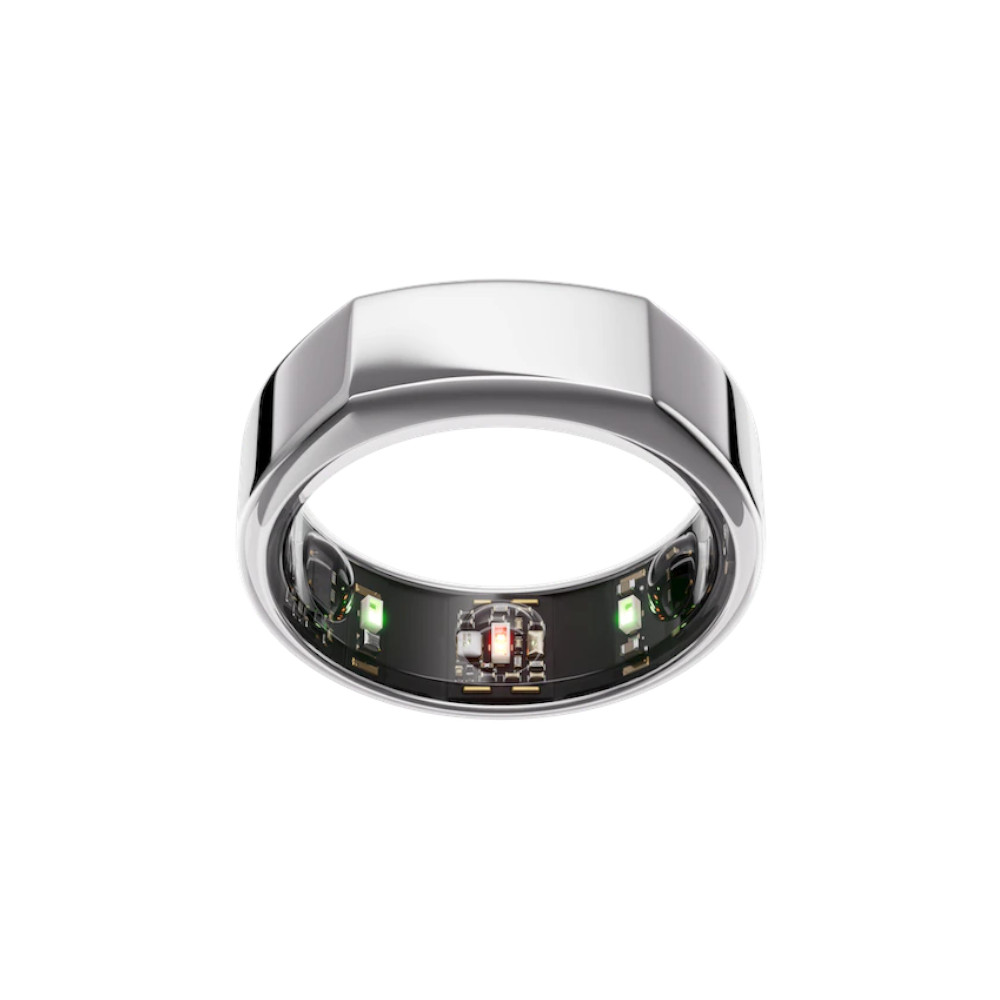

Oura Ring 3
Inconspicuous • Clean design • Excellent sleep tracking
An excellent and unintrusive sleep tracker that focuses on personal wellness more than numbers
The Oura Ring 3 is a smart ring that tracks your sleep, activity, and heart rate. Its minimal design makes it inconspicuous to wear while sleeping, working, exercising, or even when out to a fancy dinner. The companion Oura app takes a well-rounded approach to health, focusing on your overall well-being.
The Oura Ring 3 may be the smallest device on this list, but it packs huge benefits for users. Despite its tiny stature, the ring manages to fit in impressive, accurate sensors to provide key health and fitness tracking. The heart rate monitoring on the Oura Ring 3 is especially important as the company uses unique algorithms to provide users with overarching views of their activity and rest.
First and foremost, Oura stresses holistic health monitoring. In the Oura app, users’ data is presented as three scores: Readiness, Sleep, and Activity. These scores summarize several factors to offer users clear takeaways on a daily basis. More than any other tracker we’ve tested, the ring continues to adapt to you the longer you use it, identifying trends and offering actionable insights. You can dig into more details at will, or rely on the broad picture Oura provides. We find the company especially successful in tracking and distilling sleep data, which makes sense as the Oura Ring originally started as a sleep tracker. The Oura Ring 3 also boasts a reliable temperature sensor, which Oura puts to fantastic use in women’s health tracking, including pregnancy tracking.
Notably, the Oura Ring 3 is not as successful at tracking specific workout data as other options on this list. For example, it doesn’t calculate details like pace or running power. Instead, the Oura Ring 3 simply uses heart rate to identify workouts. It then factors these workouts into your Readiness and Activity scores. It also doesn’t have a screen, which can be a deal breaker for those who want real-time stats throughout their gym session. We find the lack of screen refreshing as it minimizes the distracting nature of some wearables. It’s compatible with iPhones and Android phones, offering users from both camps a solid screen-free option.
What makes it stand out
- A small form factor: The Oura Ring 3 is the perfect pick for anyone who doesn’t want to broadcast they’re tracking their stats.
- No distracting display: In addition to blending in like traditional jewelry, the ring lacks any type of display or haptics, which can distract users on other devices.
- Fantastic sleep platform: Oura originally arrived on the scene with a dedicated sleep focus. Though the company has since expanded, it still offers some of the best overnight tracking in the game.
What to look for in a good fitness tracker
Those new to fitness trackers might not be completely sure where to start. To choose the right device, consider the following:
Your style of workout matters
What do you plan to use your device for? Do you want a tracker that can do it all or a more specialized watch? If you’re a swimmer or a diver, you’ll want a water-resistant device that can handle certain depths. Likewise, runners need built-in GPS with accuracy they count on.
Form over function, or vice versa
Will you want to use the tracker long-term if you find it uncomfortable? Is comfort less important than simply looking good? That’s important to figure out, too. Some of the best fitness trackers work well but may be too bulky or not aesthetically pleasing. Others are designed with style in mind but sacrifice features.
How smart do you want your fitness tracker to be?
Some fitness trackers and smartwatches offer advanced features. These included everything from stress tracking to music controls, third-party app support, voice calling or assistant support, and much more. If you want everything and the kitchen sink, a smartwatch is probably the right choice, or something that crosses the line between a traditional fitness band and a fitness watch — like the Charge 5.
What features do you need versus find “nice to have?”
Maybe you’re buying a fitness tracker to “get into better shape.” In most cases, you can probably do just fine with a basic tracker. On the other hand, it doesn’t hurt to get a watch with extras. Consider the value of tools such as a heart rate monitor, GPS, or SpO2 tracking when searching for the best fitness tracker for you.
Features for serious health concerns
If you’re interested in the best fitness trackers for monitoring serious health concerns, you’ll want to spring for extra features. Relevant options include sensors for monitoring blood oxygen levels, heart rate, and other important metrics.
How crucial is the battery life on your fitness tracker?
If you plan to use this for long hikes or situations where battery life is a concern, you’ll want something that can last days, if not weeks. Meanwhile, if you want smarts, you’ll have to settle for something that needs more frequent charging. The best fitness tracker is the one that aligns with your fitness habits.
Will it work with your current device, and what’s the app like?
Not all devices work with both Android and iOS phones. The Apple Watch only works with iPhones, for example. Depending on your paired device, some watches will offer different features or a better experience. Unless noted in the descriptions below, all the recommendations in this list are compatible with both major smartphone platforms. However, don’t overlook the device’s companion app itself. For example, the Mi Band is a great fitness tracker in terms of hardware, but the app experience isn’t nearly as robust as you’ll find from Garmin or Fitbit.
What’s your budget?
What you spend on your new tracker is up to your budget. The Fitbit Charge 6 rings up higher than some cheaper trackers because it’s a higher-quality device. Meanwhile, springing for a fitness-tracking smartwatch will set you back even further. However, it may be worth the investment for a well-rounded experience. On the other hand, if you have a low budget and aren’t sold on how much you’ll use a fitness tracker, we absolutely recommend a budget option.
Which is your favorite, go-to fitness tracker brand?
280 votes
Why you should trust us & how we test
Android Authority has a long history with wearable devices, spanning at least as far as the Pebble in 2013. Since then, we’ve reviewed hundreds of wearables and learned a lot along the way. Our dedicated health and fitness experts test dozens of new wearables and fitness trackers yearly. Only the best make it onto recommendation lists like the one you are reading. How do we determine what’s worthy? When testing, we have two main focuses: user experience and accuracy. To that end, we start by utilizing the device as a daily driver:
- We wear the product 24/7 (except for charging time) to evaluate its day-to-day performance, capabilities, and comfort.
- We note everything from strap materials and display brightness to navigation and battery life.
- We tap into as many features as possible, leaving no stone unturned.
- We set alarms, chat with voice assistants, fire off texts, follow breathing exercises, sweat through workouts, and much more.
- We test sleep tracking accuracy and wear the watch to bed, comparing its data to other products well-regarded for their sleep analysis.
- We test SpO2 sensors against other wearables or a pulse oximeter.
- For heart rate monitoring, we equip chest straps to test the device’s accuracy and push the sensor through interval training workouts.
- We also test GPS accuracy on outdoor runs and rides wearing the device and a notably accurate GPS device to see how the review unit performs.
- When possible, we strap on a comparable device from the current market to analyze how the review subject stands up to similarly priced competition.
- We dig into the companion app. We look to see how the data is organized and analyzed and evaluate the ease of use.
Smartwatches and trackers have a ton of variety, and reviewing each product is quite nuanced. For example, a Garmin Fenix 7 Pro review looks very different from a Xiaomi Mi Band review. So, we also determine the wearable’s place in the market based on form factor, target audience, and budget. Then, we check to see if the device is missing anything important that users might expect to see. Finally, we verify that it matches its brand’s (measurable) claims.
You can trust that our experts put every device through its paces. Typically, our review period lasts about a week. However, we sometimes extend it to weeks or months for especially feature-packed devices. We also regularly revisit watches and trackers to ensure they hold up over time.
FAQs
Compatibility is always device-specific, but all of the options on this list are compatible with iPhones. Similarly, all of the devices are also compatible with Android devices except for the Apple Watch.
For the sake of this article, we refer to devices with big displays that prioritize apps and notifications as smartwatches. We refer to devices with small displays that look more like a traditional fitness band as fitness trackers. In reality, many smartwatches have fitness tracking tools, and many fitness trackers have smartwatch features.
The answer to this varies. Typically, no tracker will be as good as higher-grade medical equipment like chest straps and monitors. However, some brands come closer than others. Fitbit, Garmin, and Apple are three brands known for their accuracy.
Garmin and Fitbit devices are each best suited for different users. Garmin offers a data-heavy experience for serious athletes, while Fitbit is a great option for more casual tracking. Read more about the differences between these two industry leaders in our Garmin vs Fitbit comparison guide to find out which company offers the best fitness tracker for you.
Smart water bottles are a different kind of fitness tracker that helps you monitor your hydration habits. If you struggle to stay hydrated, a smart water bottle may be worth considering.
There are a variety of trackers available for kids of different ages. For young kids, we recommend the Fitbit Ace 3 or Garmin vivofit Jr. For teenagers, a Fitbit Charge 6 or the Apple Watch SE might be a better fit.
The Fitbit Charge 6 offers a user-friendly ecosystem and companion app suitable for older users. On the other hand, there are simpler options, including battery-efficient hybrid devices. The Withings ScanWatch 2, for example, is a beautiful hybrid device that looks like an analog watch but tracks vital health metrics.
The Noom app for healthy weight management is compatible with many powerful fitness tracker brands, including Apple, Garmin, Google, and Fitbit.

